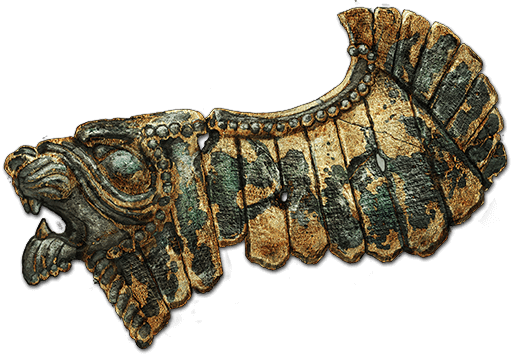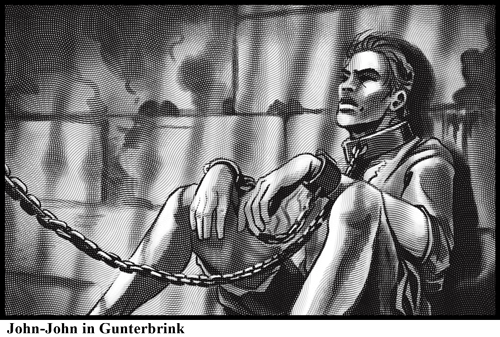
Shelby Chartrand, Augstat, Hesse
John-John, a human male eighteen years of age, is now imprisoned in Gunterbrink Prison for the high-crime of being a runaway slave in addition to a list of other charges.
John-John was born a free son to Jargo-John, a modest glass merchant in the Kingdom of Frankia. Crippled by the glass embargo of ’31, the merchant faced financial ruin after accumulating substantial debt with the Governor & Company of Adventurers Trading into Carmania Shelf.
Impoverished and the family business in tatters, John-John voluntarily sold himself into slavery to cover his father’s debts. By Imperial law, a parent may not forcibly sell a child or any other family member into slavery—one must volunteer. Was John-John’s noble act one of duty to a father and family or might the ten-year-old child have been coerced by a parent in crisis as the family business faced ruin?
Whatever the case may be, John-John, shackled in heavy irons, had his fate chained to a slave caravan bound for Tavja.
Later that season, John-John was sold to Soggery Hill Farms near the town of Nidaros in Tavja, where the strong young man slaved under whip and cruelty for a decade raising swine. This past fall, John-John accompanied his master, old man MacSoggery, to Augstat to sell their drove of pigs at market.
What happened next that led to John-John being remanded to Gunterbrink?
TRADECRAFT
Each year, Hessens eagerly look forward to the Week of Faith, which is shepherded by Faithful, the anumian that encourages loyalty and devotion to the things we cherish: our family and friends, country, religion, and work. Faith Week culminates with Tradecraft Day, when hardworking Hessens celebrate conscientious devotion to one’s occupation. I speak for all Hessens when I say we take soulful pride in our life’s pursuits.
But not all jobs are equal, and this past Tradecraft Day proved just that when a slave riot in Palan-Hessen Kriese turned into a mass escape. Conservative estimates suggest a hundred slaves or more may have escaped, sending parts of the city into panic and lockdown.
On the morning of Tradecraft Day, Yar-borg Octoni, the owner and meister of Octoni Armory & Smith Works, and his sons Godi and Yonnus were scheduled to deliver supplies to the Three-Penny Stockyards. The boys accompanied their father according to the Tradecraft Day time-honored tradition with hopes of better understanding and learning his profession.
At midday, the employees of the Three-Penny Stockyards and their own sons were treated to a holiday feast honoring the Hessen ethic of earnest work. By late afternoon, however, the feast had taken a dark, wicked turn, spiraling into a lecherous pit of debauchery, no doubt fueled by excessive drink and exotic intoxicants.
What transpired next can only be described as a hellish scene of mass rape.
Naked and screaming, young slaves—men and women, humans and elves, it mattered not—were bodily dragged kicking and screaming from cages one after another and forced to perform vile sexual acts. Beatings were plentiful and frequent.
Is this kind of brutal and inhumane treatment of slaves typical? Are festivals and “parties” such as the one that transpired on Tradecraft Day commonplace?
The workers who attended the Tradecraft Day Three-Penny Stockyards feast are inexplicably absent—thus, no firsthand accounts are available. The owners refuse to be interviewed or answer business-related questions, and employees have been strictly forbidden to speak to anyone outside the company.
Nearby ranchers who work at Blood & Meats meat packing witnessed the bedlam from afar and had plenty to say regarding the incident. “Yes, it is so. Sex with slaves is a common pastime for many of the workers at Three-Penny,” said Raimo, a bovine butcher. “They have stalls in the back for this. If one of them has the desire, they already have the means.”
“Mass rape?” The butcher shook his head when asked if occurrences of this sort had happened before. “Nein, I know nothing of such cruelty. I have not seen or heard of this.”
Not all who attended the Tradecraft Day feast, however, take such a tolerant stance regarding sexual violence perpetrated against slaves. While details remain sketchy with gaps in the timeline, it seems clear one of the Octoni sons was uncomfortable with what he was witnessing and refused to participate. The boy allegedly attacked his father, and in the confusion of that attack, proceeded to release slaves, flinging open cage doors and encouraging them to run. The slaves, of course, faced with the options of freedom or rape, required no further encouragement. What came next was a rage riot. Stockyard workers, soused on the good lord’s hooch, were ill prepared for the wave of fleeing slaves, and they fell over themselves giving chase. It would have been a comical scene to behold if not for the serious nature of the crime.
“The two boys were shouting. One had a sword that he waved about clumsily,” said Raimo, pantomiming the sword waving with a cattle poker. “ It seemed the big one might kill the smaller one, I was certain. The smaller one, he was leading slaves as if he knew them. Perhaps as friends? Slaves were scattered all over, and the workers—well, most were blind-drunk and without clothing. They were trying to round them up. Dummköpfe.”
As the old saying goes: One does not get between a dragon and gold and a slave and freedom.
“Ja, ja, the boy opened the cages and set the entire slave force loose. Rats from a sinking ship is the expression, ja? People running far and wide, and the workers stumbling like fools trying to stop them.”
Caught up in the commotion of the escape, the young Octoni fled the stockyards with a group of slaves. His father, Yar-borg, was taken in by the Hecks for questioning and refused to be interviewed.
The Hecks have issued a warrant for Yonnus Octoni’s arrest, charging him with inciting a riot and assisting runaway slaves.
A Heck officer, who requested to remain anonymous, said, “The kid assaulted his father and released the slaves. Knowingly and willingly opened cage doors. Busted free damn near all of ‘em.
RUNAWAY LAWS
The Fugitive Slave Satzung enacted by the Haus der Herren as part of the Slave Law Coalition (in the pre-Kordavan Empire) mandates that all escaped slaves be seized and returned to their owners. Anyone found aiding in their flight, directly or indirectly, faces steep fines, loss of limb or eye, and in the most serious situations, can be ordered by a magistrate to be sold into slavery themselves. Naturally, such harsh realities keep even the most well-intentioned do-gooder from assisting a runaway.
The Slave Bounty Satzung adds further teeth to the prevention of runaway slaves. This law offers bounties for the capture and return of escaped enslaved people.
Within the first few hours of the mass escape, more than half of the fleeing slaves had been rounded up and returned to the stockyards. Tired and beaten, most were happy just to have a warm place to sleep that night. Huntsmen with their bloodhounds followed the other slaves as they ran for the hills. Many were caught running across farmers’ lands; others were found huddled in barns and alongside creeks in an attempt to disguise their scent with the water. Those who made it into the city proper were soon turned over by citizens fulfilling their civic duty, pointing them out in alleys and sewer. Most wore rags or no clothing at all, making spotting a runaway relatively simple.
Within hours, bounty hunters were called in—hardened soldiers, erstwhile gravers, or those merely down on their luck looking for easy coin. Recovering runaway slaves can be a lucrative business for those souls who don’t mind working the seedy underbelly of the slave industry.
The Hecks are asking for additional assistance from concerned citizens. If you suspect someone is a runaway slave or have found a discarded “Slave Tag,” please report these to your local guard station. Do not help a runaway. Do not approach or try to apprehend them yourself. Runaway slaves are considered potentially armed and extremely dangerous. For your own safety, call in the Hecks.
CIVILIZED CIVILIZATION
Is Hesse civilized?
Why yes, Hesse is by all accounts a civilized nation. We have a monarchy system of government with a konigin and the Haus der Herren that administers our laws and courts. We have a highly developed society, socioeconomic independence, free trade, museums, arts, and schools of higher learning. Citizens have liberties and the freedom to come and go as they please, secure in the knowledge they’ll be treated fairly. We have wide freedoms to practice mystic arts, witchcraft, and wizardry, and freedom of religion (that is, until superseded by Imperial law that the Church of Set is the one true Chaldean religion; however, freedom of religion continues to be an active law on Hessen books).
Why, then, do we allow slave trade in our kingdom? How can we, an avowed civilized nation, put up with such barbaric, savage, and inhumane treatment of sentient beings?
One word: economics.
The Hessen economy benefits from and relies upon the lucrative slave trade, and businesses that either directly support the trade or indirectly benefit from its mechanics are the foundation that keeps this country alive and thriving. Small and large companies alike benefit from free slave labor. The government directly benefits from slave trade (importing and export), taxing associated businesses, shipping, and sales (the government receives a direct 30% auction transaction tax). The consistent keyword is benefit.
It is estimated some ten thousand slaves pass through Hessen ports each year. Tavja, Hesse’s largest slave-trading partner, accounts for some 60 percent of all slave commerce, through both import and exports. Tavja imports almost exclusively female slaves and exports primarily males. In Akkadia, the opposite is the case: a female-dominated society subjugates men, nearly all of them slaves. Kingdoms like Tavja, Akkadia, and others have thunderous appetites for free labor, and thus buy, sell, and trade through Hessen stockyards. All of this business needs a support structure, which Hessen businesses are all too happy to supply. Businesses like the Three-Penny Stockyards and Octoni Armory.
FOLLOW THE MONEY
With that much money keeping the steamworks of industry churning, there’s little doubt that palms in Regierungsbezirke (the government Kriese of Augstat) are well greased as encouragement to keep the profits flowing. Government officials and nobles are paid handsomely to maintain open slave trade, an economic engine of flesh and suffering.
We spent a few hectic hours at the Round Tower (the Hecks’ headquarters), kicking desks, trying to get anyone to go on the record. While slavery is perfectly legal in Hesse, many people remain ironically nervous when asked to comment on the topic, quickly becoming preoccupied with shuffling paper and counting boards in the ceiling. These noble knights of the realm, with their code of chivalry, were more obsessed with tracking down runaway slaves than investigating allegations of mass rape.
A senior official, who requested anonymity, stated flatly, “Slaves are property, assets, product. They have null rights.” This same official dropped a stack of tomes in our laps: twelve thousand pages of slave ownership case law. “Let me boil this down to a few simple words. Slave owners are free to do as they choose.”
Slave owners primarily draw their legal imprimatur from a Haus der Herren decision, Adalfuns v. Roza. “Open Hand” Satzung, relating to slave treatment, historically exists in many kingdoms of Chaldea. Established and widely accepted corporal punishments include flogging, beating, branding, mutilation, blinding, humility sex, and the use of the stock and pillory.
How did this young boy see more clearly the inhumanity of the slave trade than our own lawmakers and politicians? He would agree, it seems, that Hesse has a long way to go yet to achieve what we believe ourselves to be: a kind, just, and civilized nation with freedom for all. He dared stand up against tyranny, facing ridicule and imprisonment, for what he believed was right. Were we all so brave.
And what of John-John?
Back in Gunterbrink, the young slave sits in solitary, hoping beyond hope that runaway charges against him are proven false.
In the wee hours of the following day, post-Tradecraft Day and after the slave riot/escape, John-John was loitering about Harbor Loop West after exiting the Bitter End Pub; he was looking to join a merchant marine as a deckhand when he was captured by patrolling bounty hunters and turned over to the Hecks. From there, he was remanded to Gunterbrink as a runaway slave. And there he has stayed for the last six months.
John-John bears the Soggery Hill Farms tattoos on his body but claims he was formally released from service by his former owner, MacSoggery, before the old man died of the pigpox. Unfortunately, he has no freedom papers, as his master died unexpectedly. Thus, he has no evidence of his innocence, though he claims it vehemently. No witness has stepped forward to refute the claim. And if he cannot prove his innocence within the next two weeks, John-John will be sold into slavery to pay for costs accrued during his imprisonment.

Marn Prohibition
Calls for prohibiting Marn delicacies in Hesse is gaining steam and support amongst the Haus der Herren as incidents of “Marn Madness” become more and more frequent. Most notably, this week’s annual “Marnfest” held in Altiflector resulted in a series of mass hallucinogens that ended in thirteen overdoses. Four people remain in a permanent state of Marn Madness.
“Hullabaloo,” said Blaskar, simulating a jerking hand. “Hogwash and kerfuffle. Much ado about nothing.”
Blaskar, the owner of an alchemy shop and a Rubenstein practitioner, deals in the business of alchemy and narcotics. “Marn madness, pfftt! They are just enjoying a spiritual journey across the astral plane. Eventually they’ll come back. They usually do.”
The jungle kingdom of Marn produces a wide array of mystical and outright magical stimulants, liquors, tobacco, teas, spices, incense, tattoos, and grafts. The latter specialty products require the procurer to travel to the kingdom of Carpental in Somarria in order to obtain them.
“Sure, people have died on the stuff,” Blaskar laughed, hugging his belly. “But people have died from drinking too much, eating too much, and sexing too much. So what? It ain’t the government’s business to regulate what I can and can’t do with my body. If I want to commune with my dead wife by sniffing Marn incense, that’s my prerogative.”
If Marn delicacies are outlawed in Hesse, the practice will likely be forced underground, where organizations like the Black Daggers will make a fortune dealing in the illegal substances. The Hecks already refuse to enter Altiflector and enforce basic laws. If murder and rape go unpunished in the derelict dwarven city, there will be no stopping the transportation, sale, possession, and consumption of Marn delicacies.

Augstat Gnubble Reopens
The Gnome Communication Guild has finally repaired and reopened the Gnubble location on Marathon Road in Guildhaus in Augstat, reuniting the city with the rest of Chaldea. For nine months, the Gnubble was out of operation, forcing international communication via Gekkon courier or slow ship.
“Gnubbles are sophisticated, highly sensitive transmission apparatuses,” said the gnome public relations officer. “The clockwork and steam technology are extremely old and delicate. It’s what makes our unique communication system so magical. Rarely, but unfortunately on occasion, when a gnubble malfunctions, it takes one of our expert engineers some time to research the problem and great effort to fix it.”
Pressure on the Gnome Guild has been relentless from both the public and government agencies to get the machine operational. One could almost hear a sigh of relief from the austere
gnome officer in his crisp formal coat and breeches while reporting its reopening. “We apologize for our absence and look forward to once again serving your communication needs.”

Clan Week Celebrations
This week kicks off dwarven Clan Week in Augstat, an annual dwarven holiday when large segments of the dwarven population make pilgrimages across Niessia and travel as far away as Tamica for a week of clan festivities.
After last year’s “Pompadour in the Street” riot caused numerous injuries and vandalism, Augstat officials strictly forbade clan celebrations inside the city center. This year, the Hecks are working double duty to maintain the peace by keeping the streets safe from dwarven hooligans. The cost of the overtime is allegedly being billed to the clans.
“It’s racism and intolerance against the dwarves,” remarked a frustrated Augerfeld, a prominent Boars Kriese citizen. “I’m clanless and won’t be attending, but even I recognize bigotry in its rawest form—they are looking for any excuse they can find to keep us out.”
It is hard to argue the point, with official terms seemingly so obvious. Similar unruly events in International Fair were dubbed as a “fracas”; the term “riot” seems reserved for the dwarves.
Lordint Durjak has graciously offered to host all Clan Week festivities at his sizeable keep in Digger’s Dump. A renowned dwarven blacksmith and well respected across racial divides, Lordint Durjak has created pieces proudly owned by nobles and wealthy gravers across the empire. Even Emperor Kordaava is said to be a big fan of his work and owns several original pieces.
The Ferg Clan of Augstat is once again hosting the 340th annual hilltop games at the Hillabad Nord Acres. Not to have their thunder stolen, the Durstock clan intends to eclipse last year’s dragon-slaying competition by offering two dragons hauled up from Tetonique. If proving to Hessen authorities that Clan Week is a safe, family friendly affair, importing live dragons into the city may not be the way to inspire confidence.

Hoot Weret Restoration
Chaldea’s oldest temple is soon to get a much needed (and some say richly deserved) image makeover.
The Hoot Weret of Set within International Faire is set to receive funds from Saratof as part of an enrichment and revitalization project in preparation for a new high priest who will soon be assigned to oversee Niessia.
“It will be the crown jewel of Set’s dynasty here in Niessia,” said Dozer, a jubilant Set priest who made the announcement to the Haus der Herren.
Historians and archaeologists are divided on the subject. “The Hoot Weret is a museum piece that should be preserved and not remade in Set’s image,” said Ottmar zur Hölldobler, the curator of the Museum of Niessia. “It should not have been disturbed and removed from Ardaya in the first place. But now that it’s here, we should protect it.”
In his youth, Marcosta Kordaava, a graver famously fond of exploration, discovered an ancient Kaldi palace buried deep in Ardaya’s Endless Desert, its stones preserved for centuries beneath tall, windswept dunes. After his coronation, Emperor Kordaava returned to Ardaya, ordered the site of the palace to be excavated and then carefully dismantled stone by stone, piece by atavistic piece. An army of archaeologists was careful to categorize and library all the palace artifacts. Then each stone was painstakingly transported by slave train to the Hessen capital, where it was rebuilt at the center of Augstat.
The thirty-year project is at long last complete. The sandstone structure stands like a strange alien object, stark amid the Hessen architecture, as if placed there from another world. Now the emperor has further plans to devote the world’s oldest structure to his god Set, it would seem.
The restoration cost estimate was not announced publicly, but it is no doubt a princely sum. All told, it is believed it will take four years to complete the remodel.



Issue #102





